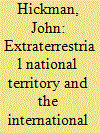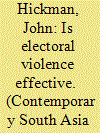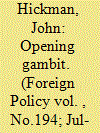| Srl | Item |
| 1 |
ID:
098143


|
|
|
|
|
| Publication |
2010.
|
| Summary/Abstract |
Analysis of the probable effects of ending the prohibition against sovereign national extraterrestrial territory in the Outer Space Treaty points to large increases in the total territories of a small number of spacefaring states as they compete in a succession of annexations that move from celestial body to celestial body. Rather than result in an increased chance of war between spacefaring states-an argument deployed by defenders of the Outer Space Treaty-extraterrestrial annexations would instead reduce its likelihood, both in the near-term because of the mutual vulnerability of human spacecraft and bases, and over the long-term by making spacefaring states less vulnerable to terrestrial warfare.
|
|
|
|
|
|
|
|
|
|
|
|
|
|
|
|
| 2 |
ID:
111631


|
|
|
|
|
| Publication |
2012.
|
| Summary/Abstract |
This article argues that a hypothetical decision by the People's Republic of China to assert territorial sovereignty over the area surrounding its planned manned Moon base is plausible. Enhanced international prestige in the near term and access to natural resources and strategic military positions in the long term may be sufficient temptations for China's leaders to challenge the United States to a twenty-first century space race. Strategic surprise could be successfully employed, given the opacity of Chinese decision-making; the conceptual blindness of external observers, including decision-makers, analysts, and academics; and China's repeatedly demonstrated capacity for executing military or diplomatic surprises of comparable magnitude. The ability of signatory states to withdraw from the 1967 Outer Space Treaty with one-year's notice means that international law only poses a temporary obstacle to such a decision. A manned Moon base would fulfill the condition of effective occupation necessary for territorial sovereignty under international law. An international relations constructivist approach discourages consideration of the advantages to states of territorial aggrandizement or the weakness of international law in restraining the behavior of states.
|
|
|
|
|
|
|
|
|
|
|
|
|
|
|
|
| 3 |
ID:
092248


|
|
|
|
|
| Publication |
2009.
|
| Summary/Abstract |
This research note reports empirical findings from a study of the effectiveness of electoral violence and intimidation in Sri Lanka's 2005 presidential election. Using the previous 1999 presidential election as a baseline for comparison, analysis conducted at the polling division level reveals that both United National Party (UNP) candidate Ranil Wickramasinghe and United People's Freedom Alliance (UPFP) candidate Mahinda Rajapakse experienced declines in the percentage of votes in polling divisions where opponent party activists committed acts of violence or intimidation. Fewer polling divisions reported violence or intimidation by UNP than UPFP activists, but the former appear to have been more effective in demobilizing voters.
|
|
|
|
|
|
|
|
|
|
|
|
|
|
|
|
| 4 |
ID:
170450


|
|
|
|
|
| Summary/Abstract |
This article offers a preliminary checklist for identifying the geopolitical motivations of decision makers responsible for major famines, events defined as economic and social crises causing one million or more excess deaths. Three geopolitical motivations are identified in three major famines in the twentieth century. The 1932–1933 Ukrainian famine illustrates the strategy of starving a geographically concentrated, politically distrusted minority into submission and repopulating areas with politically trustworthy settlers and indoctrinated or assimilated traumatized famine survivors. The 1943 Bengal famine illustrates the starvation of politically distrusted populations in areas likely to be lost to invasion to make consolidation of that conquest expensive and to impede further conquest. The 1994–1995 North Korean famine illustrates the starvation of population in areas that pose a lesser risk of catastrophic regime delegitimation. Given the near certain decrease in grain production and probable declines in livestock production and fish catch in the Global South anticipated with climate change, decision makers are likely to be tempted to execute major famines to realize these geopolitical objectives. The geopolitical advantage from major famine thus merits the attention of famine-studies scholars.
|
|
|
|
|
|
|
|
|
|
|
|
|
|
|
|
| 5 |
ID:
101729


|
|
|
|
|
| Publication |
2010.
|
| Summary/Abstract |
Events during the first decade of the new millennium have contradicted scholarly predictions made in the 1990s about the declining relevance of the sovereign territorial state in international affairs. The state remains the proper primary focus of attention for scholars of international relations because territory remains the ineluctable and ultimate basis for power in the international system. Under the United Nations Convention on the Law of the Sea, states have claimed enormous new territories that have added to the power resources of coastal states. This realist analysis contributes to identification of the likely locations of future interstate wars and a major objective of strategic planners.
|
|
|
|
|
|
|
|
|
|
|
|
|
|
|
|
| 6 |
ID:
156931


|
|
|
|
|
| Summary/Abstract |
Every occupying power recruits collaborators but potential recruits vary with respect to their acceptance by occupied populations. That matters because the legitimacy of the occupation regime facilitates securing the war aims of the occupying power. This article surveys the different reasons why collaborators often elicit popular contempt, a response which may inspire insubordination and resistance, to produce a conceptual stencil of the optimal rather than the ideal collaborator. Limited pools of potential recruits mean that occupying powers may not be able to recruit ideal candidates. The resulting conceptual stencil can serve a checkoff list for evaluating the utility of potential collaborators.
|
|
|
|
|
|
|
|
|
|
|
|
|
|
|
|
| 7 |
ID:
115851


|
|
|
| 8 |
ID:
158353


|
|
|
|
|
| Summary/Abstract |
Geoengineering proposals are increasingly acknowledged as possible responses to climate change because of the repeated failure of national decision makers to solve the collective action problem of allocating carbon emission reductions at the Conference of the Parties to the United Nations Framework Convention on Climate Change. Geoengineering is attractive, the possible moral hazard notwithstanding, because of differences in the economic effects of climate change across countries, which are organized as factions seeking to shift the burden of carbon reductions or to delay response. This article outlines the political economic advantages of a planetary sunshade to reduce the amount of sunlight reaching the Earth. Rather than adopt the more common game theoretic model to describe the relevant international relations, construction of the planetary sunshade is characterized as an auction in which a single spacefaring power completes construction of the megaproject as a global good, comparable to the willingness of the United States to provide the dollar as a global reserve currency, and then determines the average global temperature based upon financial or material contributions from other countries. The willingness to contribute is based upon calculations of preferred average global temperatures.
|
|
|
|
|
|
|
|
|
|
|
|
|
|
|
|
| 9 |
ID:
081324


|
|
|
|
|
| Publication |
2008.
|
| Summary/Abstract |
If and when interplanetary and interstellar trade develop, it will be novel in two respects. First, the distances and time spans involved will reduce all or nearly all trade to the exchange of intangible goods. That threatens the possibility of conducting business in a genuinely common currency and of enforcing debt agreements incurred by governments. Second, interstellar trade suggests trade between humans and aliens. Cultural distance is a probable obstacle to initiating and sustaining such trade. Such exchange also threatens the release of new and dangerous memes
|
|
|
|
|
|
|
|
|
|
|
|
|
|
|
|
| 10 |
ID:
169970


|
|
|
|
|
| Summary/Abstract |
How do the three major schools of international relations theory – liberal internationalism, realism, and constructivism – account for the second space race, the rivalry between China and the United States to scientifically explore and economically develop the Moon? This article assesses answers drawn from these three schools of international relations. Rather than distance from the Earth, surface area, and resource endowment, it is the lack of native population and status as a commons in international law that make the Moon a novel object of international relations. From the perspectives of both liberal internationalism and constructivism, the Sino-American rivalry represents failure. International institutions and organizations, which were established to extend the liberal world order into outer space, failed in this case to restrain the behavior of China and the United States. The diplomatic communication between Chinese and American national decision-makers failed to draw them into adherence with the norm of international cooperation encoded in those international institutions and organizations. By contrast, realism accounts for the second space race as an example of balancing of power. National decision-makers ignored international institutions and organizations together with international norms to gain or not lose relative international prestige, business opportunity, and potential economic growth.
|
|
|
|
|
|
|
|
|
|
|
|
|
|
|
|
| 11 |
ID:
110883


|
|
|
|
|
| Publication |
2012.
|
| Summary/Abstract |
This article outlines a theory explaining why and how states open territorial frontiers, an inquiry overlooked by students of international relations because of assumptions that most territorial sovereignty issues had been decided following the Second World War-that territoriality was of declining relevance in international affairs, and that the state would be eclipsed by transnational political actors. States open frontiers for the same reason they acquire client states: additional territory offers additional power resources-strategic military position, access to natural resources, captive markets, and international prestige-which are important in an international environment characterized by anarchy. Assertion of sovereign claims to new territory is the precursor to economic development and perhaps settlement. The latter require the state to absorb unrecoverable costs as well as much of the economic risk for private firms and settlers.
|
|
|
|
|
|
|
|
|
|
|
|
|
|
|
|